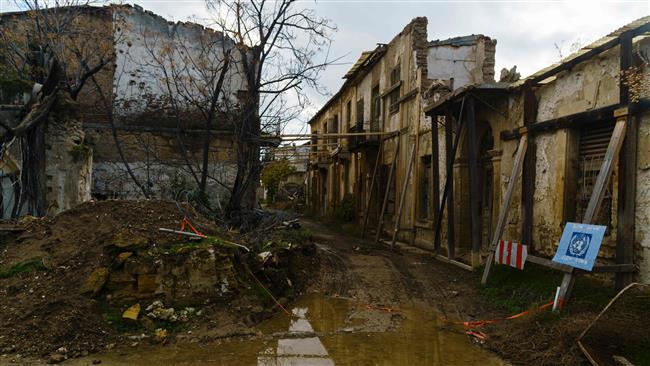Cyprus talks end; sides agree to meet again
The new session of peace talks for Cyprus has ended with merely an agreement for the sides to meet again at a later time to make another attempt at finding a political solution to the decades-long dispute on the Mediterranean island.
The foreign ministers of Turkey, Greece, and Britain temporarily pulled out of the talks on Thursday after failing to narrow differences on security guarantees for the island’s disputed ethnic Greek and Turkish communities.
Britain, Turkey, and Greece, are Cyprus’ so-called guarantor powers.
Newly-appointed UN Secretary-General Antonio Guterres, however, said the participants had “made important progress” during the one-day conference.
“Of course, there is still a lot of work to be done. We are going now to work at deputies-level to prepare what could be the proposals for, at political level, a decision to be taken,” Guterres said after the conference.

Cypriot President Nicos Anastasiades and North-Cyprus President Mustafa Akinci resumed the negotiations at the Palais des Nations in Geneva, overseen by UN Special Advisor Espen Barth Eide.
Anastasiades and Akinci are leading their respective communities, and the negotiations were directed toward finding a way to reunite Cyprus as a loose federation of two constituent, largely self-governing states.
Turkish Foreign Minister Mevlut Cavusoglu described the talks as “useful.”
“Today’s meeting was very useful, [I’m] not disappointed,” Cavusoglu said. “We frankly shared our position on different issues, particularly, on security and guarantee issues. At the end, we found out that we have totally different positions.”
Greek Cypriot government spokesman Nikos Christodoulides said the talks “will continue at the level of the technocrats on Jan. 18.”
Cyprus has been traditionally partitioned between ethnic Turks and Greeks.
In 1974, however, Turkey’s armed forces occupied the northern parts of Cyprus in response to Greece’s efforts to annex the Greek-speaking-majority east Mediterranean island to Athens.
Several past attempts to find a political solution have failed, and despite Greece and Turkey’s NATO alliance, they have come at times to the brink of war over Cyprus.

Cyprus is a former British colony, and the UK still retains its military bases and installations, as well as land, on the island. The Sovereign Base Areas of Akrotiri and Dhekelia constitute so-called British Overseas Territory on the island of Cyprus.
Meanwhile, dozens of ethnic Greeks staged a protest against the terms proposed by the UN for the reunification of Cyprus outside the Presidential Palace in the Greek-section’s capital, Nicosia.
Some 800,000 Greek Cypriots and about 220,000 Turkish Cypriots live on the island.
Greek Cypriots, who represent Cyprus in the European Union, want the withdrawal of more than 35,000 Turkish troops from the island. Turkish Cypriots are eager that reunification would equate membership in the EU.
VIDEO | Press TV's news headlines
Israeli strikes on north Gaza hospital ‘extremely dangerous, terrifying’: Director
VIDEO | Yemen targets Tel Aviv with Palestine 2 missiles
Pezeshkian: Iran resolved to complete North-South Transport Corridor
VIDEO | Iran-Syria: For Resistance
Qassam Brigades claims killing 3 Israeli troops in northern Gaza
More alive than ever: Sayyed Hassan Nasrallah's legacy grows stronger in martyrdom
Occupation of Syria’s highest peak Mount Hermon part of ‘Greater Israel’ project












 This makes it easy to access the Press TV website
This makes it easy to access the Press TV website